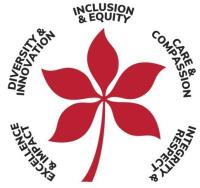Diversity, Equity, Inclusion, and Engagement
The Department of French and Italian at The Ohio State University is dedicated to cultivating an inclusive and diverse learning, living, and working community where all individuals are valued and empowered. These commitments align with OSU’s core values, articulated in the Commitment to Diversity and Inclusion and the Shared Values. In accordance with these values, we recognize that diversity represents many dimensions such as race, ethnicity, culture, nationality, socioeconomic background, history of educational access, gender identity, sexual orientation, disability, life experience, age, and political perspective. We believe in creating an environment that values and respects diversity, equity, and inclusion in all these forms. We understand that diversity and inclusion are essential components of our excellence.
As a department, the heart of our mission lies in an engagement with the rich diversity and pluralism of the French and Italian-speaking worlds. Our scholarship, teaching, and programming explore the cultural products, literature, cinema, art, and language of these regions, with an emphasis on understanding diverse populations, texts, and movements. We address critical topics related to migration, boundary crossings, the legacies of colonialism, multiculturalism, intercultural competence, and gender and sexuality through our teaching, research, and service. We are committed to creating an environment where we engage with our fields of study, challenge their shortcomings, and work towards their improvement.
In pursuing our mission, we further equity through admissions and recruitment practices, digital accessibility, curriculum design, and innovative instructional approaches. Our faculty, staff, and graduate students are intent on cultivating supportive and inclusive learning environments, providing all students with the necessary resources for their well-being and academic success.
We believe that engagement is an essential component of our investments in diversity, equity, and inclusion. Our work extends outside the classroom, as we connect with our communities in Columbus and beyond. We collaborate with local organizations, host events both on and off campus, and welcome community members to participate in our activities. By embracing diversity and fostering engagement, we enrich cooperative educational experiences and contribute to a more inclusive and just society.
As a department, we further our dedication to diversity, equity, and inclusion through our DEI and Engagement Committee. The role of the committee is to serve as a forum for sharing and consolidating best practices and creative ideas that are already active in our community, by our faculty, staff, and students. The committee also acts as a steward for advancing DEI values through the department’s teaching, service, and engagement.
- Professor April Weintritt.1 - Committee Chair
- Dr. Ryan Joyce.289
- Professor Qian Liu.12199
- Professor Giuliano Migliori.2
- Dr. Anne Mutidjo.1
- Professor Kate Schlosser.73
- Matt Lang.650 - Staff
2024-2025 - TBD
2017
- Founded as Diversity and Inclusion committee (DI).
2018
- Designed the “FRIT means” campaign.
2019
- Renamed as Diversity, Equity, and Inclusion (DEI).
- Designed and implemented a diversity and inclusion survey which became a point of reference for DEI committees across Arts and Humanities and led us to present our work to other DEI chairs per the request of Dean Wendy Smooth.
2020
- Renamed as Diversity, Equity, Inclusion, and Anti-racism (DEIA).
- Composed departmental messages on Black Lives Matter and debates surrounding Christopher Columbus statues.
- Designed a teaching module on Christopher Columbus for use by our instructors.
2021
- Held biweekly Zoom “open houses” for all department members to support our community and help talk through and process the pandemic, protests, and other social changes.
- Procured the free use of two Anti-Racism trainings from Coursera for all faculty, graduate teaching associates and staff members in FRIT.
2022-2023
- Hosted two DEI events, for current undergraduate students and undergraduate alumni and for current graduate students and graduate alumni, with the goals of: making the voices of current and past students heard, establishing professional and personal contacts between current students and alumni, facilitating new ways of looking at DEI in diverse professional settings, and sharing concrete knowledge gained through personal experiences
2023-2024
- Developing partnerships with local French immersion middle and high schools
- Creating dialogic exchanges with community organizations and Columbus’ French-speaking immigrant communities
- Showcasing OSU’s Shared Values by spotlighting Associated Faculty who demonstrate commitments to diversity, equity, and inclusion in their teaching

